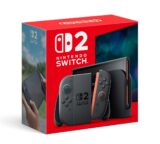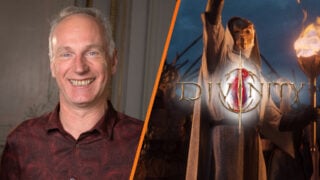How PlatinumGames is betting on Nintendo expertise to shape its future
VGC speaks to the Bayonetta studio’s new CBO, along with leaders Inaba and Kamiya, about its latest developments

Image Credit: Famitsu
A common theme in our interviews with PlatinumGames over the past few years has been control.
When I first visited the studio’s Osaka, Japan headquarters in March 2019 – two months before the launch of VGC – I reflected on how it spent its first decade making glitzy work-for-hire projects for publishers such as Sega, Konami and Nintendo, but in the process giving away ownership of its own original franchises.
Sprawled across the carpet in Platinum’s vibrant lobby area are numerous critically-praised IPs created by the studio, from the stylish Mad World and Vanquish, to the excellent-but-overlooked Wonderful 101 and its iconic action game Bayonetta.
At the time, of the 15 titles it had created in its first ten years, Platinum didn’t own a single fibre of the games on that floor (though it appears that it’s since reobtained The Wonderful 101 IP).
It was clear Platinum wanted more control going forwards; over its franchises, over its business and over how it communicated to its fans.
Cut to 2022, and although it’s taken some tentative steps forward – notably in self-publishing smaller titles in The Wonderful 101 Remastered and Sol Cresta – it feels like there’s still lots of work to be done in Platinum’s mission to take control of its destiny.
This can be seen in the little it can tell us about Bayonetta 3 without permission from publisher Nintendo, or the disappointing launch – and upcoming closure – of Square Enix-published service game Babylon’s Fall, which was clearly developed under conditions it’s not totally satisfied with.
However, there was a notable announcement this summer that could speed up Platinum’s ambitions: Nintendo’s former General Manager of Licensing (at Nintendo Co., Ltd.) and Managing Director of Sales Planning and Strategy (at Nintendo of Europe GmbH), Takao Yamane, has joined as the company’s new vice president and CBO.
Before joining Platinum, Yamane served for seven years as the general manager of Nintendo’s licensing department. Before this, he oversaw planning and strategy as part of Nintendo of Europe. Before moving to NOE, he first spent time at Nintendo as the Vice President of Nintendo France.
VGC spoke with Yamane, along with PlatinumGames CEO Atsushi Inaba and vice president Hideki Kamiya, to discuss the thinking behind the hiring, what happened with Babylon’s Fall, and the latest noises behind the cancelled Xbox exclusive Scalebound.
Mr. Yamane, you worked at Nintendo in various positions for over 20 years. What made you decide to make the switch to PlatinumGames?
Yamane: I guess the main thing was all the projects that PlatinumGames is actually going to be doing from now moving forward. That was the main point that attracted me to join the company.
Was returning to Osaka a factor, since you studied there at university?
Yamane: Not really, because geographically, Osaka is next to Kyoto, where I worked originally for Nintendo. So they are basically like neighbouring states, so to speak. So rather than looking at maybe going back to my roots, it’s more like working in the same area as I had before. But that said, I’m pretty much in Tokyo every week anyway!
When Platinum announced Mr. Yamane’s appointment, you said he would cause the company to “change significantly”. Could you expand on that?
Inaba: As PlatinumGames, up to now, we’ve only been a developer and basically, we just had a function as being a development studio. But I think moving forward, what we want to look at is to how we can create games, communicate, sell, and publish those games to our user base. Rather than just being a developer that only creates games for clients.
Creating a game and communicating to our user base and publishing the game is something new that we definitely want to take on. I think Yamane-san is definitely the person to make that happen for our company and that opportunity and that challenge could actually expand on that publishing effort for us.

You recently self-published your first games with The Wonderful 101 Remastered and Sol Cresta. Were there signs from that experience that you could maybe do with some outside expertise?
Inaba: I think the biggest thing for the two titles that you mentioned is that was pretty much like a practice run for us, per se, and got us going bigger in this whole publishing effort. Our dream has been for a while to go and develop our own games and publish our own games, but we haven’t actually had a chance to do that yet.
Obviously, if we were to jump into that pond with a largescale title, without any people who have real expertise on how to make a title and begin to self-publish, it would have been a huge risk for us and would have led to a pretty huge failure. We knew that we needed that experience internally to go ahead and self-publish moving forward. The two titles that you mentioned, Wonderful 101 and Sol Cresta, were a practice run for us ultimately, but what we want Yamane-san to do moving forward is pretty much on another level to those titles.
Yamane-san, what aspects of Nintendo culture will you bring to PlatinumGames?
Yamane: So when I was at Nintendo, I was charged with being the main person for Nintendo’s business for the Chinese market at the time. In addition, I supported third-party publishing. So basically, for any third-party publishers bringing their software onto Nintendo hardware, I was in charge of supporting that whole effort globally.
“Wonderful 101 and Sol Cresta were a practice run for us ultimately, but what we want Yamane-san to do moving forward is pretty much on another level to those titles.”
At the time, I would pretty much look at over 1000 titles on a yearly basis. I was looking at all the titles, looking at the percentage of sales figures, whether it be in sales for the global market or sales for the Japanese market, and in what market the title would do well.
I was looking at those figures frequently and reading into basically the global sales and the estimates for those titles and trying to break that down within myself. Moving forward, I want to use that expertise and knowhow at PlatinumGames to foresee and be able to better orient the direction of our titles.
You already have a strong history of partnering with Nintendo. Could Yamane’s appointment bring that relationship even closer?
Inaba: Well obviously, Yamane didn’t leave Nintendo on bad terms at all and this partnership that we have with Nintendo is very important to us right now and will be moving forward. I think with Yamane-san joining us here, PlatinumGames can definitely build an even stronger relationship with Nintendo moving forward. That can only be a positive thing for PlatinumGames. So yeah, we’re very glad to have him on board.

Mr. Yamane, what was your view and experience of PlatinumGames when you were at Nintendo?
Yamane: When you view PlatinumGames, I think from the perspective of game fans worldwide, or game journalists such as yourself, they kind of look like the “bad boys” of gaming. Looking at the studio from a global perspective and the impact that it actually has, I think that image actually describes the studio very well! It’s like a group of passionate ‘bad boys’ who get together to make really creative games. This is the same view that I had at the time.
PlatinumGames formed a partnership with Nintendo for Bayonetta and with Square Enix for Nier Automata. It’s known that PlatinumGames are a studio who doesn’t listen to what they’re told! (Laughs) There is that certain pride that exists within the studio: “we want to make what we want to make, and we want to do it the way we want to do it. Because we think it’s the right way.”
And there is that tendency for them to try to push through all the barriers to make that happen. And that sense of pride and that sentiment I think is what sometimes gets Platinum into some kind of head-on collisions with our partners. I’ll let Inaba and Kamiya add to that.
Inaba: Yeah, that’s pretty much right! (Laughs)
Inaba and Kamiya felt more and more like they were becoming more involved in the business side in recent years, especially with your promotions. Was an aspect of Yamane’s hiring, to allow you to get more involved in game development again?
Inaba: This might be different for Kamiya, but for me particularly, I think my role is probably clearer right now than ever. I’m kind of doing what I want to do, and my role is to express that verbally to the people around me and tell them what my vision is for what I want to do.
“It’s known that PlatinumGames are a studio who doesn’t listen to what they’re told! (Laughs) There is that certain pride that exists within the studio”
For example, I want us to be able to make what we want, I want us to have our own IPs that we can develop with care, I want us to build a bigger fanbase. It’s as simple as that, and that’s why we are venturing into self-publishing.
Often I needed to reach into the development effort to orient the game better, to try and make it a little bit more successful for our company. But I think moving forward, my role, as I said, is a lot clearer. I get to say what I want to say, and I get to do what I want to do and obviously have my people around me who will help me make that vision come true.
Kamiya: I’ve always been very close to the development teams, and I’ve always been involved with that development effort, and that hasn’t really changed up to now. Obviously, having Yamane-san joining the company who’s kind of more business oriented and focused on that area of our operations allows me to actually still maintain my position that’s very close to the teams and the development effort itself and do what I want.
I can tell the team what my wishes and my vision for the game are, and that’s really good for me. At the same time, I kind of feel sorry for Yamane-san, to give him this huge effort and business focus. Inside I’m happy because I can continue to do what I love doing, but I also feel really sorry for Yamane-san as well!
Kamiya-san, Phil Spencer recently responded to your callout for Xbox to revive Scalebound, and he didn’t appear to deny it could be…
Yamane: Let me take this one, because if we let Kamiya-san answer this then I think he’s going to give away a little too much unnecessary information maybe! (Laughs) All I can say on record here is that, as PlatinumGames, we can’t comment or say anything about this.

Should fans read into the fact that both yourselves and Microsoft are suddenly now not commenting on the subject? Is that necessarily indicative of a change in the situation, or not?
Kamiya: As I just answered, I am more on the development end of the company and as you know, I was on the dev team for Scalebound when we were going through the project initially. I was the director of the title itself. As a creator, I still have quite a lot of loving attachment to the project, to be honest with you, since the project is something that we started.
It is what it is in terms of what happened… we started the project, and unfortunately, it got stopped. But I still do have that attachment to the project itself, and if there were ever a chance, it would be great to revisit the project and be involved with it once again.
In terms of what Phil Spencer was saying, I’m not really sure where that reaction came from and what he was actually thinking… we’re not really sure, to be honest with you. But if in any way he has changed his mind in a positive way for us, then that’s something that we’re very happy about. “Personally”, it’s very positive from my own viewpoint.
(In English) Phil! Let’s do it together again! (Laughs)
So since you publicly called out Spencer earlier this year to revive the project, did you receive any response?
Kamiya: I didn’t receive a Twitter DM from Phil, unfortunately!
Since shortly after Scalebound was cancelled in 2017, Nier Automata was released. Since then, you haven’t released any of your five console games on Xbox, including 3 multiplatform titles. Why is that?
Inaba: We’re a developer, so we don’t really have any say or choice on what platforms we’re going to release our games on. We develop the game for the publisher, and the publisher basically holds that whole platform strategy in their own hands. So, we can’t really say anything, it’s completely up to the publisher.
“In terms of what Phil Spencer was saying… if in any way he has changed his mind in a positive way for us, then that’s something that we’re very happy about.”
But personally, Xbox is a very important hardware platform moving forward, and we definitely want to keep Xbox in our sights moving forward for our titles. We want to release our titles on as many platforms as possible moving forward, so we definitely have Xbox in mind.
What about the two games you did publish recently, The Wonderful 101 Remastered and Sol Cresta. Why didn’t they release on Xbox?
Inaba: The reason is simply that we couldn’t make it in time as we didn’t have enough hands on deck. Basically, we were just too busy to include Xbox into our platform support. That’s pretty much it. There were no issues per se with Xbox hardware – that was not the case. And it wasn’t a case of us believing we wouldn’t sell any copies on Xbox or anything along those lines.
It was just basically that we didn’t have enough hands on deck both in development and publishing to, develop the titles, release the titles, and also self-publish on the timeline for Xbox, when we started to look at our platform support. We couldn’t get it onto our list for the platforms we wanted to release the games on, unfortunately.
So going forwards, can Xbox owners expect to see your games release on their platforms? Will Project GG release on Xbox?
Inaba: Our platform strategy is basically to cover as many platforms as we possibly can and attack from all angles. That’s what we’re thinking right now. With Yamane-san leading our publishing efforts for PlatinumGames moving forward, we are open to many different opportunities with different platforms. So, teaming up with Microsoft to put content on Xbox is definitely something we’re open to. We’re not negating any possibilities.
We’re open to all possibilities, whether that be for all other first parties, whether it’s talking with Sony, Microsoft, or whoever else approaches us saying they want exclusive content on their platform, we are definitely open to those discussions as well. We are very happy to have our content on as many platforms as possible.

Babylon’s Fall is closing less than a year after its launch. Is there anything you can tell us about why that has happened?
Inaba: So, firstly, the important thing that I want to note is that we’re not able to comment on certain areas of games developed with our partners, because we’re not publishing the title that we’re developing and have certain obligations to the publisher. Going out and discussing the content of these titles or any kind of pertinent situations to do with the title itself is not something we’re allowed to do without approval from the publisher. The reason is that we don’t own that IP, unfortunately.
And that’s one of the reasons we’re not fond of our current situation that only limits us to game development, to be honest with you. We don’t have the freedom to express ourselves in this way. That’s one reason why we want to strive for a self-publishing effort. But in terms of any concrete reasons or the process that led to this conclusion of the title, you’d have to go ahead and ask Square Enix about the details, unfortunately.
The only thing we can comment on here in terms of the closure of the Babylon’s Fall service itself, is that this unfortunate conclusion might have been something that had triggered some disappointment, perhaps maybe even anger, to our dedicated fans and players. And any disappointment that we might have caused for our fan base is something we feel extremely sorry about, the fact that we led our dedicated fans to feel that way as a developer.
Providing any sentiment other than enjoyment and fun in our creations to players is something that we’re not very happy about at all as a developer. So yeah, that’s about as much as we can comment.
I know there’s not much you can say about Babylon’s Fall specifically. But you’ve made no secret of your ambitions to create a live ops game like this in the past. What have you learned about how you should do things in the future regarding live service games?
Inaba: There are two pillars, so to speak, that we can look at internally for our development teams, that being the people within the same company. The first is just the sheer fun of the core game mechanics that you have in the live service game and secondly, performing the live service itself.
“Any disappointment that we might have caused for our fan base is something we feel extremely sorry about, the fact that we led our dedicated fans to feel that way as a developer.”
I think these two pillars are values that need to be strongly connected internally and need to be viewed, treasured, and valued by the same people, on the same team, at the very same company. Otherwise, if one of these is valued over the other or if they’re not connected, things usually don’t turn out the way we would have wanted them to. We want to focus on keeping that connection and that balance between those two pillars moving forward.
Does Babylon’s Fall’s failure affect your future plans? Do you still want to make live ops games in the future?
Inaba: There’s a lot that we learned from this experience, and it’s not changed our future plans or outlook moving forward regarding doing live service games at all. Live service games are definitely something we do want to do and put our effort in moving forward.
It seems you might have some frustration over not having full control over the destiny of the project. Is that fair?
Inaba: Keeping this answer limited to Babylon’s Fall would skewer the discussion I think, but similar to what I said, if you’re a developer and also the publisher, your role obviously does change. But it doesn’t mean that even if you have ultimate control of the title that you’re not going to have any frustrations in the long run, regardless of whether you are a developer or a publisher.

If we hypothetically were to do everything on our own to develop the game, with full control, then if we failed it’s pretty much 100% on us and if we succeed it was basically on us. And we are not viewing ourselves as “special” in any kind of way if we were to go ahead and do everything ourselves.
But I think this whole “frustration” story is something that we should not deny in this interview, but rather admit the fact and make this end result clear, move on, and connect this experience to our efforts moving forward. This is the only way to not feel frustrated in the long run.
Bayonetta 3 is coming up in a few weeks. Kamiya-san, how does it feel for you as a creator making games for what, spec wise, is now quite ageing hardware? Does that factor into your approach?
Kamiya: Fundamentally speaking, as a creator, I don’t feel dependent on hardware. We have the hardware in front of us, and whatever the hardware is, whatever the environment that we’re developing the game for at the time, we try to make the best out of what we have and feel good about it.
And that’s exactly how we approached Bayonetta 3: we had to make use of the full potential of the hardware that we have. And as I said, this mentality will be the same on every hardware platform that we’re developing games for moving forward, and not a mentality that is limited to the Nintendo Switch.
Personally, this is a very lifestyle-oriented preference for myself, but right now I feel it’s really difficult for me to actually “sit” still in front of the TV and play games. For me, I lie down and play games in portable mode and I enjoy games that way, and that’s the biggest reason why I like the Nintendo Switch.
Whenever the new hardware that Nintendo decides to launch next arrives, I personally do hope that they still have this portable element so that it can support my lifestyle of playing games as I lie down!












